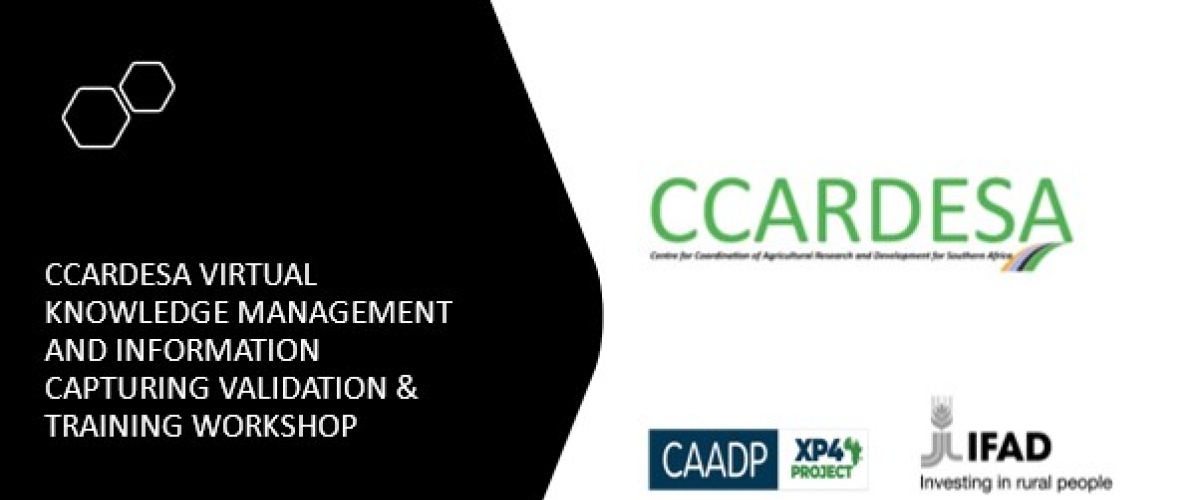
The Centre for Coordination of Agriculture Research and Development in Southern Africa (CCARDESA) hosted a scientific Symposium the morning before its 2nd General Assembly on June, 10th 2021. The focus of the Symposium was on the implications of climate change on agricultural productivity and the call for agricultural transformation while ensuring sustainable food systems. The Symposium drew people from the SADC region and beyond, to reflect on find long-lasting and transformative solutions towards the food security related challenges that are confronting the region.
The CCARDESA Executive Director, Dr Cliff Sibusiso Dlamini, during his opening remarks, acknowledged the impact of climate change in the region and the world at large. He reminded the participants that the symposium aimed at sharing technical progress made towards combating climate change. A topic which he intimated aligned well with the UN Food Systems Summit scheduled for September 2021. Dr Dlamini requested the participants to think about globalization and the environment, specifically regarding the political economy of climate change and food. He posed thought provoking questions to the participants in relation to how to feed the hungry SADC region, boost sustainable food production, address the maldistribution of food, and adapt to agricultural constraints caused by climate change.
Dr Dlamini indicated that climate change exposes millions of people to food insecurity and poverty. He added that climate shocks disproportionately affects the most vulnerable, including women and children because they are found in places that are most vulnerable to climate change. When climate disaster hits, their already vulnerable condition worsens. Dr Dlamini reminded the participants that as they deliberate on addressing climate change issues in southern Africa, they should think globally but act locally.
Dr Philip Thornton, the Team Lead for the "Priorities and Policies for Climate-Smart Agriculture" Flagship of the CGIAR Research Program on Climate Change, Agriculture and Food Security (CCAFS), gave the first keynote address on current climate and agricultural scenarios in the SADC region. He urged the participants on the need to adopt smarter agricultural practices to ensure food security. He also mentioned climate-induced diseases like foot and mouth diseases and pests, including fall army work as affecting the region. Dr Thornton revealed how climate change can be combated by ensuring water-secure livelihoods and also the use of innovative technologies.
Dr Lewis Hove, the Resilience Team Lead for the Food and Agriculture Organization of the United Nations (FAO) Southern Africa region, gave the second keynote address where he spoke about climate change adaptation, mitigation and food systems, including achievements, challenges and needs in the SADC region. Dr Hove cited population growth as one of the challenges that propel climate change through production of greenhouse gases. He spoke this in the light that as more people increase, so does their demand for more food, leading to more stress on food production. He also mentioned that the preference for modern foods instead of traditional foods poses a lot of risks to climate change in that modern foods require energy to be processed. In contrast, conventional food are eaten in an unprocessed way. He also indicated that there was also a rise in demand for more animal protein which was putting pressure on the land because livestock, if not well managed, can increase the effects of climate change.
Dr Hove noted with sadness that temperatures are getting hotter and drier, which means more drought and floods. He also cited intense drought affecting some parts of the SADC region, particularly Madagascar, Southern Namibia, and Angola. He indicated that if the region continues with this trajectory, Southern Africa's global warming will be twice that of the global rate. The meeting learned that to adopt modern technologies is needed to address climate crisis needs.
Despite the cited challenges, the meeting learned that more than ever before, there has been over USD 120 billion injected in over 40,000 projects to address climate change in the region. Paradoxically, there is also a rise in the number of small scale farmers receiving food handouts, which, if not checked, could lead to over-dependency. However, despite these resources, there is no notable increase in food production because smallholder farmers are not using smart climate practices to increase food production.
Panellists drawn from the partner organizations proposed introducing early warning systems to arrest climate change effects. They also suggested more research on climate-smart agriculture practices, reducing greenhouse gas emissions, mechanized systems, and collecting accurate data to drive evidence-based policy making. A call was made on reducing over-dependence on maize which is susceptible to drought by shifting towards drought tolerant crops and other nutrient-dense crops such as small grains. Furthermore, to educate the public on the other valuable commodities which are healthy and easier to produce under local conditions.
By the end of the Symposium, it became clear that if the climate change situation does not improve in the SADC region, two-thirds of arable land could be lost by 2025 due to climate change. This calls for political will and adopting climate-smart agriculture practices to save the land from deteriorating. Land is the most valuable resource that the region has because it is the economic bedrock of the SADC region.
The Symposium was closed by the CCARDESA Programme and Grant Manager, Dr Simon Mwale. In his closing statement, he reminded the participants that climate change was a significant factor that will continue to impact agricultural production for a long time. As a result, he said CCARDESA had prioritized it as evidenced in its Strategic Plan under one of the thematic areas. He expressed his happiness that this important topical issue had been discussed successfully in the Symposium. He advised the participants to put into practice the key points that had come out of the discussions to improve the resilience of the regional food systems. He ended his remarks by thanking the panellists, the facilitators, the partners involved, all the participants, and the CCARDESA Secretariat staff. He also invited all the participants to the General Assembly that was scheduled for the afternoon.






